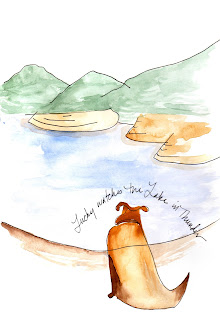Turnkey woman is ready to share her life with turnkey man.
Saturday, December 26, 2015
In a Fix: The Danger of Renovation Relationships
Turnkey woman is ready to share her life with turnkey man.
Thursday, November 19, 2015
The If of Paris
Monday, October 12, 2015
Orange Trees, Zellij tiles, and Tagines
Monday, September 28, 2015
The Elements of Southern Oregon: An Art Exhibit
 |
| "Acorn Falls," 12 x 12, Acrylic & Charcoal on Canvas |
 |
| "Milkweed Sings" 12 x 12, Acrylic & Charcoal on Canvas |
 |
| "Thistle Dreams," 12 x 12, Acrylic & Charcoal on Canvas |
And I’ll also be showing other paintings I have created in Southern Oregon that don’t necessarily portray its subject matter. But since they were “born” here, they, too, are elements of this region I’m happy to call home.
Friday, July 31, 2015
Sol y Sola
 |
| Find this and other sketches of Chile here |
Sol y Sola
Santiago & Valparaiso, Chile
I meet the friend of a friend in Santiago.
The woman I do know explains in Spanish
to the one I don’t: She’s traveling alone.
With my limited bit of the language,
I catch this. The she is me.
The friend looks at me, eyes wide: ¿Sola?
I catch this like a stone.
I’ve traveled across many continents alone.
Going solo is my go-to.
But in this gendered language,
the feminine alone sounds final—
a label I didn’t know I wore.
I smile and nod, Sola.
Two days later, my friend flies away,
and I’m truly alone. A dense, urban haze
smothers the sun, el sol.
Sol, solo—do they share a story?
I pull my coat close and look at the
white sky. I take a bus to the sea,
but the sun hides behind clouds.
I step into a small restaurant.
¿Sola? asks the waiter.
I smile and nod, Sola.
He leads me to a blue table by the window.
I sit in the light of two candles
and sip wine until one burns out
and the other is sola.
If the word for candle in Spanish is feminine.
If I can remember the word for together.
If there is clarity in “alone.”
If I bring my own light with me.
If I will dream of sun.
Next morning, I wake before the birds.
When dawn stretches
up the hill, the day expands with light.
The sol rises solo,
brightening every building,
every person walking by,
every dog barking.
I smile and nod.
I remember the word
for together.
Thursday, June 18, 2015
Cielo
Valparaiso, Chile
On a gray and grafitti’d street
in a town named for paradise,
three men in fluorescent jackets
take a bread and beer break.
With my Spanish limited to nouns,
I ask the way to Ascensor
Espíritu Santo—the funicular
named Holy Spirit.
The men smile, and one points
around the corner.
I thank them, walk five steps,
pay 100 pesos, and climb
into the square box
that will take me up the steep hill.
A man sits inside on the thin bench,
holding a plastic bag of fresh pan—
the funicular fills with its fragrance.
Another man enters,
then an old woman, also carrying
a bag of bread. Then one more woman
and a young man. We are six.
We smell like a panadaria.
We sit and stand in silence.
I want to ask how often these residents
ascend the oiled tracks, but I don’t have
the words beyond bread and heaven.
The box lurches and we launch up—
the three of us on the bench shifting
into each other in a bodily kiss of greeting,
and the three standing sway as if starting to dance.
Who extends the invitation?
And to what are we invited?
We climb the mountain without using
our own limbs. We have entered a body
beyond ourselves. We have been invited
to a communion of passage,
drinking height as we rise up the rails
to a different story. And though we don’t feel it,
we are being transformed in these loud
seconds of ascension, as gears sing
with practiced harmony, as the memory
of an oven sends the scent of bread
praying to air, sky, heaven.
The Sunday before, I visited
a little church, knowing only the couple
who invited me but not their language.
All the congregation kissed
my gringa cheek in greeting as they entered.
I waited for the six guitars to begin their praise,
my face raw with buenos días.
Just before the music began,
a woman with a box of grape juice in her hand
and worry on her face, asked me a question
I could not unravel the words to.
Yet I knew what she asked.
Sí, I answered—to belief.
To eating the bread and drinking the blood.
Yes to remembering a body beyond myself.
The funicular stubs to a stop.
We passengers look anywhere but into
each other’s eyes. Maybe one minute passed,
yet all of time has broken open among us.
The plastic bread bags rustle, announcing
the end of this brief service.
The door rattles open. We arrive
to El Museo de Cielo Abierto.
Choose your translation: the Museum of
Open air? Open sky? Open heaven?
Here, the walls, the streets, the stairs
are covered in murals dark and light,
dull and bright. A sleeping dog
and a stack of pink trash bags watch
over the entrance to this steep place,
filled with every art—to this steep life,
the Museum of Open Heaven.
[This poem appears in the anthology, Thin Places & Sacred Places]














